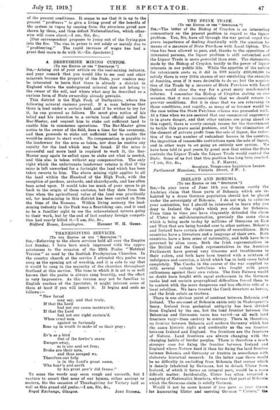IRELAND AND BOHEMIA.
[To THE EDITOR OF THE " SPECTATOR.")
SIR, In your issue of June 14th you dismiss curtly the Austrian claim that those parts of Bohemia which are inhabited by a dense German population should hot be placed under the sovereignty of Bohemia. I do not wish to criticize your contention, but I should .be interested to learn why you deny to Ireland the rights which you claim for Bohemia. Prom time to time you have eloquently defended the claim of Ulster to self-determination, precisely the same claim which is being made to-day by millions of Germans on East and West that are being handed over to other nations. Bohemia and Ireland have certain obvious points of resemblance. Both countries have a literature and a language of their own. Both countries have a keen sense of nationality, and both have been governed by alien races. Both the Irish representatives in the British and the Czech representatives in the Austrian Parliament have proved very tiresome and troublesome to their rulers, and both have been treated with a mixture of indulgence and coercion, a blend which has in both cases failed completely. The Czechs in the course of the war supplied us with several valiant battalions who fought with great enthusiasm against their own rulers. The Sinn Feiners would no doubt have fought with equal enthusiasm in the German ranks had not certain geographical difficulties forced them to be content with the more dangerous and less effective rile of a local rebellion. We have treated the Czech deserters as heroes, and the Irish rebels as traitors.
There is one obvious point of contrast between Bohemia and Ireland. The sea-coast of Bohemia exists only in Shakespeare's fancy. Ireland from geological antiquity has been divided from England by the sea, but the land frontier between the Bohemian and Germanic races has varied—as all such land frontiers vary—from century to century. There is, therefore, no frontier between Bohemia and modern Germany which has the same historic right and continuity as the sea frontier between Ireland and England. Sea frontiers are the frontiers of Nature. Land frontiers are always changing with the changing habits of border peoples. There is therefore a much stronger case for fixing the frontier between Ireland and England where Nature fixed it than for fixing the land frontier between Bohemia and Germany or Austria in accordance with elaborate historical research. In the latter case there would be no difficulty in excluding from Bohemia that corner which is densely inhabited by Germans, but to detach Ulster from Ireland, of which it forms an integral part, would be a more difficult matter. Incidentally, Ulster has often returned a majority of Nationalist Members, whereas that part of Bohemia which the Germans claim is solidly German.
Would it not be more honest if you gave as your reason for humouring Ulster and coercing German " Ulsters," the
good old-fashioned right of the conqueror to do exactly as he wishes? We have made many fine professions during this war which hamper us now that the war is over. The war was a straight fight between England and Germany for the challenge cup of the world of which we were the holders in 1914. Germany challenged us, and Germany has been beaten, and Germany must pay the price. Part of that price is the loss of German territory in accordance with old-fashioned precedents. Had Germany won she would have treated us much as we are treating her. Agreed. Let us then bury in a dark cupboard those banners of freedom which we waved during the war, applying Wilson's tiresome ideas to free those small nations which have been oppressed by the Germans, while we retain in Ireland a hundred thousand soldiers in order to prevent the Irish exercising that r'ght to self-determination for •which we claimed to be fighting. What is sauce for the Czech is most obviously not sauce for the Sinn Feiner.—I am, Sir, &e.,
Montana. ARNOLD LUNN.
1" Self-determination " is an ambiguous term of enemy origin. We slid not go to war with such a watchword. Mr. Lunn in his ingenious analogy suggests that the Austrian rule in Bohemia was no worse than British rule in Ireland, but he knows, of course, that there ivas no possible comparison between the two. The analogy is misleading. Bohemia is an ancient kingdom whose frontiers have not varied for ages. We may liken her to the United Kingdom, and her small Merman minority to our small Irish Nationalist minority. Bohemia declines to allow the German minority to secede just as we decline to admit the Irish minority's demand for a Republic. Self-preservation as a principle must take precedence of " self-determination."—ED. Spectator.]



































 Previous page
Previous page